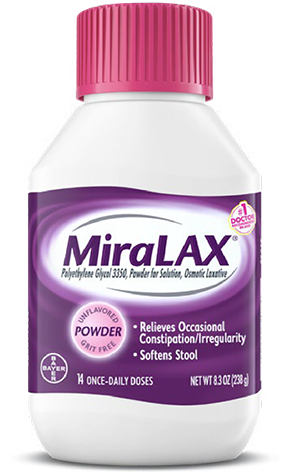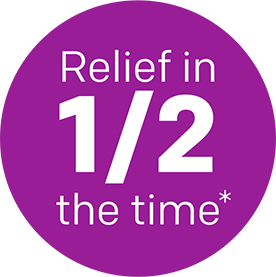Triple Action
Triple Action
HYDRATES | SOFTENS | GENTLY RELIEVES1-3 |
HYDRATES | SOFTENS | GENTLY RELIEVES1-3 |


Start patients on MiraLAX® first
Start patients on MiraLAX® first
MiraLAX® has a triple mechanism of action1-3 and efficacy proven in multiple clinical trials.4-8
CLINICAL CORNER
What’s the link between diabetes and constipation?
What’s the link between diabetes and constipation?
Upwards of 75% of patients with diabetes mellitus report gastrointestinal symptoms12,13; up to 60% have constipation.12,14 Is there a connection? While the exact mechanism might not be known, diabetic neuropathy may play a part.14-16

In a clinical study, patients taking MiraLAX® reported relief in half the time of that reported by those who waited9
In a clinical study, patients taking MiraLAX® reported relief in half the time of that reported by those who waited9
Based on patient-reported complete satisfactory bowel movements (CSBMs) during week 1. For patients taking MiraLAX® (n=148), the median number of days to first experience a CSBM was significantly fewer than (half) that of patients taking placebo (n=64), P=0.001.
*Compared with placebo. Works in 1-3 days.
Your patients like these could benefit from starting MiraLAX® sooner
Your patients like these could benefit from starting MiraLAX® sooner

Patient resources
Patient resources
Access downloadable tools to help support your patients.
Click to expand.
References: 1. Schiller LR, Emmett M, Santa Ana CA, Fordtran JS. Osmotic effects of polyethylene glycol. Gastroenterology. 1988;94(4):933-941. doi:10.1016/0016-5085(88)90550-1 2. Hammer HF, Santa Ana CA, Schiller LR, Fordtran JS. Studies of osmotic diarrhea induced in normal subjects by ingestion of polyethylene glycol and lactulose. J Clin Invest. 1989;84(4):1056-1062. doi:10.1172/JCI114267 3. Andrews CN, Storr M. The pathophysiology of chronic constipation. Can J Gastroenterol. 2011;25(Suppl B):16B-21B. 4. DiPalma JA, Cleveland MvB, McGowan J, Herrera JL. A randomized, multicenter, placebo-controlled trial of polyethylene glycol laxative for chronic treatment of chronic constipation. Am J Gastroenterol. 2007;102:1436-1441. doi:10.1111/j.1572-0241.2007.01199.x 5. Cleveland MvB, Flavin DP, Ruben RA, Epstein RM, Clark GE. New polyethylene glycol laxative for treatment of constipation in adults: a randomized, double-blind, placebo-controlled study. South Med J. 2001;94(5):478-481. 6. DiPalma JA, Cleveland MB, McGowan J, Herrera JL. A comparison of polyethylene glycol laxative and placebo for relief of constipation from constipating medications. South Med J. 2007;100(11):1085-1090. doi:10.1097/SMJ.0b013e318157ec8f 7. Lee-Robichaud H, Thomas K, Morgan J, Nelson RL. Lactulose versus polyethylene glycol for chronic constipation. Cochrane Database Syst Rev. 2010;(7):CD007570. doi:10.1002/14651858.CD007570.pub2 8. Rao SSC, Brenner DM. Efficacy and safety of over-the-counter therapies for chronic constipation: an updated systematic review. Am J Gastroenterol. 2021;116(6):1156-1181. doi:10.14309/ajg.0000000000001222 9. Data on file, Bayer Healthcare. 10. Brenner DM, Corsetti M, Drossman D, Tack J, Wald A. Perceptions, definitions, and therapeutic interventions for occasional constipation: a Rome Working Group consensus document. Clin Gastroenterol Hepatol. 2024;22:397–412. 11. Rao SSC, Brenner DM. Evidence based treatment recommendations for OTC management of chronic constipation. J Am Assoc Nurse Pract.2022;34(9):1041-1044. doi:10.1097/JXX.0000000000000760 12. Piper MS, Saad RJ. Diabetes mellitus and the colon. Curr Treat Options Gastroenterol. 2017;15(4):460-474. doi:10.1007/s11938-017-0151-1 13. Maisey A. A practical approach to gastrointestinal complications of diabetes. Diabetes Ther. 2016;7:379-386. doi:10.1007/s13300-016-0182-y 14. Vinik AI, Erbas T. Recognizing and treating diabetic autonomic neuropathy. Cleve Clin J Med. 2001;68(11):928-930, 932, 934-944. doi:10.3949/ccjm.68.11.928 15. Ihana-Sugiyama N, Nagata N, Yamamoto-Honda R, et al. Constipation, hard stools, fecal urgency, and incomplete evacuation, but not diarrhea is associated with diabetes and its related factors. World J Gastroenterol. 2016;22(11):3252-3260. doi:10.3748/wjg.v22.i11.3252 16. Vinik AI, Maser RE, Mitchell BD, Freeman R. Diabetic autonomic neuropathy. Diabetes Care. 2003;26(5):1553-1579. doi:10.2337/diacare.26.5.1553 17. US Food and Drug Administration. NDA 20-698. Approval letter for MiraLAX powder. February 18, 1999. 18. US Food and Drug Administration. NDA 22-015. Approval letter for MiraLAX powder OTC. October 6, 2006. 19. Bharucha AE, Dorn SD, Lembo A, Pressman A. American Gastroenterological Association medical position statement on constipation. Gastroenterology. 2013;144(1):211-217. doi:10.1053/j.gastro.2012.10.029







